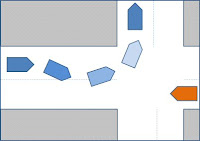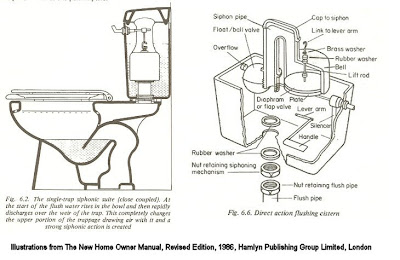For several weeks I’ve been thinking about helpful hints to foreigners planning to drive a car in England. I’m not really concerned here with drivers who are not accustomed to driving on the left side of the road; you either learn that or you don’t. There isn’t much I can add to the process. On the other hand, there are a few observations that I’ve made driving here for 25 years that could be helpful. Fore warned is fore armed, to coin a phrase.
I used to be very favourably impressed by the consistency with which English drivers signalled their intention to turn. In fact, I often found myself bragging to American friends and family about this because the habit was often lost in the States. Recently, however, I’ve noticed that signalling seems to be going rapidly out of style. A fraction of drivers – big enough to be scary -- don’t use their signals at all, so beware. With quite a few opposing cars you just don’t know what they plan to do. This lack of signalling is calls for particular caution at roundabouts. There’s another, subtler twist to signalling turns: To save effort, I suppose, a lot of drivers, when intending to execute a turn, delay the signal until the wheels are already turning. Here’s what I think is going on: One finger movement can be avoided by turning the steering wheel and tripping the signal lever with one motion. As the driver starts to turn the wheel, a finger is extended and as the wheel goes around, the signal is tripped. Sadly, it’s a little late to initiate the signal after the turn already in progress.


My advice is to be especially cautious when approaching an intersection where cars coming towards you could be turning left. The illustration on the left (imagine you’re driving the red car) shows what you probably expect to happen. What actually happens, is that the drivers opposite, when making their left turns swing out to their right side and then make their way around the corner as shown in the right-hand picture (you’re still in the red car and your clear lane just got smaller.)
Every country has them, but in England they’re universally called Boy Racers. These are the, usually young, drivers have two defining characteristics: First, they cannot abide following another car going at the speed limit or below; second, they cannot resist the adrenalin rush of passing on blind curves. It’s long been a curiosity to me why nobody seems to be concerned about the obvious gender bias in the name Boy Racer.
A variation on the Boy Racer, or maybe a sub-set, is the white van driver. For those not familiar with English traffic, most trades such as plumbers, carpenters, gardeners, etc. drive around for their work in small to medium white vans. They are always in a hurry to get to the next job or delivery, or the nearest pub for all I know. Other road users are well advised to observe the same caution with white van drivers as with Boy Racers.
The opposite of the Boy Racers are the elder drivers. (I must come clean hare and confess that I am something of an elder myself, although hopefully not an “elder driver”.) For some reason most elder drivers own the smaller models of Volvos, so they’re easy to spot. These cars come equipped with a speed governor, maybe just a block of wood taped to the underside of the accelerator pedal. This device limits the Volvo’s speed to 30 miles per hour regardless of the legal or safe limit on the road. The most fun is to be had watching a competition between and elder driver and a Boy Racer approaching a blind curve.
Herefordshire is a very rural county and the predominant local industry is agriculture. A lot of apples and potatoes are grown around here. For historical reasons, most English farms are made up of fields that are not next to each other. One farmer’s land can be scattered over several different fields that can be quite a distance apart. To get on with the business of farming the farmers need to move from one of their fields to another with some considerable frequency. Now, tractors are designed to be powerful rather than fast. I think the newest models are able to move along the highway at a maximum speed of about 40 mph, and older ones are slower. The result is that long tail-backs are very common on the main roads where the speed limit is 60 mph. As these parades make their way along our curvy roads, the Boy Racer and white van drivers can be depended upon to keep the situation from becoming boring.
















